五上单词和句型(李珍)
- 格式:doc
- 大小:58.50 KB
- 文档页数:6
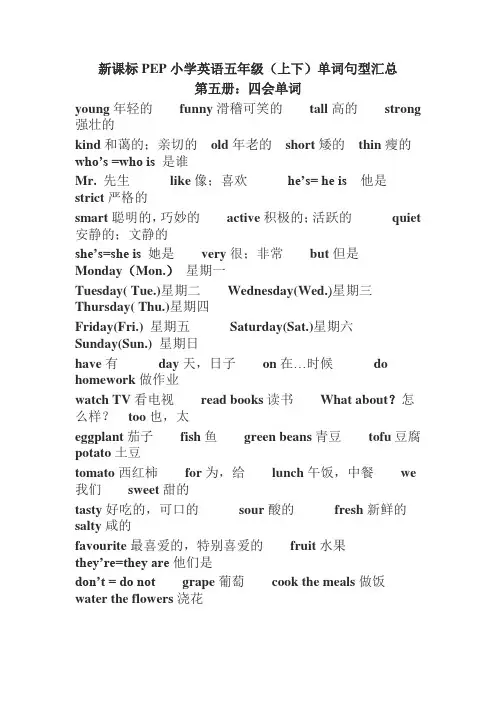
新课标PEP小学英语五年级(上下)单词句型汇总第五册:四会单词young年轻的funny滑稽可笑的tall高的strong 强壮的kind和蔼的;亲切的old年老的short矮的thin瘦的who’s =who is是谁Mr.先生like像;喜欢he’s= he is他是strict严格的smart聪明的,巧妙的active积极的;活跃的quiet 安静的;文静的she’s=she is她是very很;非常but但是Monday(Mon.)星期一Tuesday( Tue.)星期二Wednesday(Wed.)星期三Thursday( Thu.)星期四Friday(Fri.)星期五Saturday(Sat.)星期六Sunday(Sun.)星期日have有day天,日子on在…时候do homework做作业watch TV看电视read books读书What about?怎么样?too也,太eggplant茄子fish鱼green beans青豆tofu豆腐potato土豆tomato西红柿for为,给lunch午饭,中餐we 我们sweet甜的tasty好吃的,可口的sour酸的fresh新鲜的salty咸的favourite最喜爱的,特别喜爱的fruit水果they’re=they are他们是don’t = do not grape葡萄cook the meals做饭water the flowers浇花sweep the floor扫地clean the bedroom打扫卧室make the bed铺床set the table摆餐桌,摆餐具wash the clothes洗衣服do the dishes洗碗碟can’t = can not use a computer使用计算机curtain窗帘trash bin垃圾箱closet衣橱,壁橱mirror镜子end table床头柜bedroom卧室kitchen厨房bathroom卫生间living room起居室in在…里面on在…上面under在…下面near在…旁边behind在…后边over在…上面in front of 在…前面clothes衣服sky天空cloud云mountain山脉,山river河流flower花grass草lake湖泊forest森林path小路,小道park公园picture照片village乡村city城市house房子,住宅bridge桥tree 树road公路,大道building建筑物clean干净第五册四会句子:1. Who’s your English teacher?你的英语老师是谁?Mr. Carter.卡特先生。

五年级上册英语单词表和句子人教版五年级上册英语单词表。
Unit 1.- old [əʊld] adj.(形容词)老的;年纪大的。
- young [jʌŋ] adj.年轻的;岁数不大的。
- funny ['fʌni] adj.滑稽的;可笑的。
- kind [kaɪnd] adj.体贴的;慈祥的;宽容的。
- strict [strɪkt] adj.要求严格的;严厉的。
- polite [pə'laɪt] adj.有礼貌的;客气的。
- hard - working [hɑː d 'wɜːkɪŋ] adj.工作努力的;辛勤的。
- helpful ['helpfl] adj.有用的;愿意帮忙的。
- clever ['klevə(r)] adj.聪明的;聪颖的。
- shy [ʃaɪ] adj.羞怯的;腼腆的;怕生的。
Unit 2.- Monday ['mʌndeɪ] n.(名词)星期一。
- Tuesday ['tjuːzdeɪ] n.星期二。
- Wednesday ['wenzdeɪ] n.星期三。
- Thursday ['θɜːzdeɪ] n.星期四。
- Friday ['fraɪdeɪ] n.星期五。
- Saturday ['sætədeɪ] n.星期六。
- Sunday ['sʌndeɪ] n.星期日。
- weekend [ˌwiːkˈend] n.周末。
- wash [wɒʃ] v.(动词)洗。
- wash my clothes 洗我的衣服。
- watch [wɒtʃ] v.看。
- watch TV 看电视。
- do [duː] v.做;干。
- do homework 做作业。
- read [riːd] v.看;读。
- read books 看书。
- play [pleɪ] v.踢;玩;参加(体育运动)- play football 踢足球。
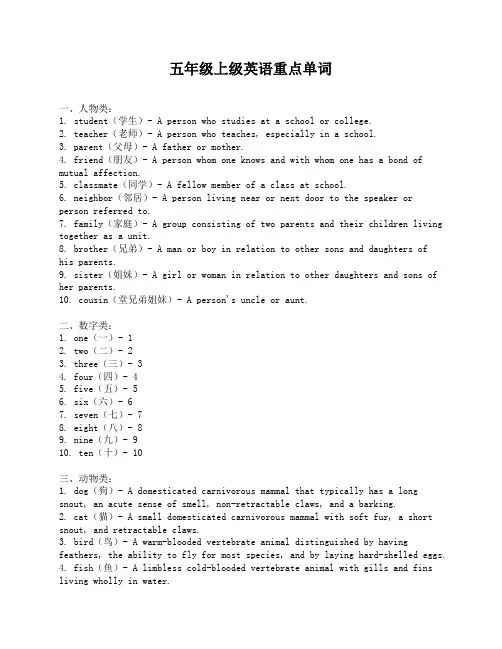
五年级上级英语重点单词一、人物类:1. student(学生)- A person who studies at a school or college.2. teacher(老师)- A person who teaches, especially in a school.3. parent(父母)- A father or mother.4. friend(朋友)- A person whom one knows and with whom one has a bond of mutual affection.5. classmate(同学)- A fellow member of a class at school.6. neighbor(邻居)- A person living near or next door to the speaker orperson referred to.7. family(家庭)- A group consisting of two parents and their children living together as a unit.8. brother(兄弟)- A man or boy in relation to other sons and daughters ofhis parents.9. sister(姐妹)- A girl or woman in relation to other daughters and sons of her parents.10. cousin(堂兄弟姐妹)- A person's uncle or aunt.二、数字类:1. one(一)- 12. two(二)- 23. three(三)- 34. four(四)- 45. five(五)- 56. six(六)- 67. seven(七)- 78. eight(八)- 89. nine(九)- 910. ten(十)- 10三、动物类:1. dog(狗)- A domesticated carnivorous mammal that typically has a long snout, an acute sense of smell, non-retractable claws, and a barking.2. cat(猫)- A small domesticated carnivorous mammal with soft fur, a short snout, and retractable claws.3. bird(鸟)- A warm-blooded vertebrate animal distinguished by having feathers, the ability to fly for most species, and by laying hard-shelled eggs.4. fish(鱼)- A limbless cold-blooded vertebrate animal with gills and fins living wholly in water.5. horse(马)- A large animal used for riding and carrying loads, having a solid-hoofed ungulate and a long flowing mane and tail.6. rabbit(兔子)- A small burrowing mammal with a soft coat, long ears, and a divided nose.7. elephant(大象)- A very large plant-eating mammal with a prehensile trunk, long curved ivory tusks, and large ears.8. tiger(老虎)- A large predatory cat with a tawny coat, native to Asia.9. lion(狮子)- A large tawny-colored carnivorous feline animal, Panthera leo, of Africa and northwest India.10. monkey(猴子)- A small to medium-sized primate that typically has a long tail, most kinds of which live in trees in tropical countries.四、颜色类:1. red(红色)- A color at the end of the spectrum next to orange and opposite violet.2. blue(蓝色)- A color intermediate between green and violet, as of the sky or sea on a sunny day.3. green(绿色)- A color between blue and yellow in the spectrum; coloredlike grass or emeralds.4. yellow(黄色)- A color like that of egg yolk, ripe lemons, etc.; the primary color between green and orange in the visible spectrum.5. black(黑色)- The darkest color, the opposite of white, absence of or complete absorption of light.6. white(白色)- The color of milk or fresh snow, due to the reflection ofall visible rays of light.7. orange(橙色)- A color between red and yellow in the spectrum, coloredlike carrots or pumpkins.8. purple(紫色)- A color intermediate between red and blue.9. pink(粉红色)- A color intermediate between red and white, of low or intermediate saturation and intensity.10. brown(棕色)- Of a color produced by mixing red, yellow, and black.五、食物类:1. apple(苹果)- The round fruit of a tree of the rose family, whichtypically has thin green or red skin and crisp flesh.2. banana(香蕉)- A long curved fruit that grows in clusters and has soft pulpy flesh and yellow skin when ripe.3. orange(橙子)- A large rounded juicy citrus fruit with a tough bright reddish-yellow rind.4. watermelon(西瓜)- A large melon with a hard green rind and sweet, juicy, usually red pulp.5. strawberry(草莓)- A sweet soft red fruit with a seed-studded surface.6. pineapple(菠萝)- A large juicy tropical fruit consisting of aromatic edible yellow flesh surrounded by a tough segmented skin and topped with atuft of stiff leaves.7. tomato(番茄)- A glossy red or yellow edible fruit that is typically eaten raw.8. carrot(胡萝卜)- A tapering orange-colored root eaten as a vegetable.9. potato(土豆)- A starchy plant tuber that is one of the most important food crops consumed by humans.10. rice(米饭)- The small, roundish seed of a cereal grass, which is the staple food of half the world's population.六、学科类:1. math(数学)- The abstract science of number, quantity, and space, either as abstract concepts (pure mathematics) or as applied to other disciplines such as physics and engineering (applied mathematics).2. English(英语)- The West Germanic language of England, universally used in science and business.3. science(科学)- The intellectual and practical activity encompassing the systematic study of the structure and behavior of the physical and natural world through observation and experiment.4. geography(地理)- The study of the physical features of the earth and its atmosphere, and of human activity as it affects and is affected by these, including the distribution of populations and resources, land use, and industries.5. history(历史)- The study of past events, particularly in human affairs.6. music(音乐)- Vocal or instrumental sounds (or both) combined in such a way as to produce beauty of form, harmony, and expression of emotion.7. art(美术)- The expression or application of human creative skill and imagination, typically in a visual form such as painting or sculpture, producing works to be appreciated primarily for their beauty or emotional power.8. physical education(体育)- Instruction in physical exercise and games, especially in schools.9. Chinese(语文)- The Sinitic language spoken in China, the most widely spoken language in the world.10. computer(计算机)- An electronic device for storing and processing data, typically in binary form, according to instructions given to it in a variable program.七、交通工具类:1. car(汽车)- A road vehicle, typically with four wheels, powered by an internal combustion engine and able to carry a small number of people.2. bike(自行车)- A vehicle composed of two wheels held in a frame one behind the other, propelled by pedals and steered with handlebars attached to the front wheel.3. bus(公共汽车)- A large motor vehicle carrying passengers by road, typically one serving the public on a fixed route and fare.4. train(火车)- A connected line of railway carriages or wagons moved by a locomotive or by integral motors.5. subway(地铁)- An electric railway operating below the ground, usually ina large city.6. plane(飞机)- A flying vehicle with wings and one or more engines, that is used for transportation and travel.7. ship(船)- A large boat for transporting people or goods across the sea.8. helicopter(直升机)- A type of aircraft that uses rotating wings to fly, capable of moving vertically and horizontally.9. taxi(出租车)- A car licensed to transport passengers in return for payment of a fare, typically fitted with a taximeter.10. boat(小船)- A small vessel for traveling over water, propelled by oars, sails, or an engine.。
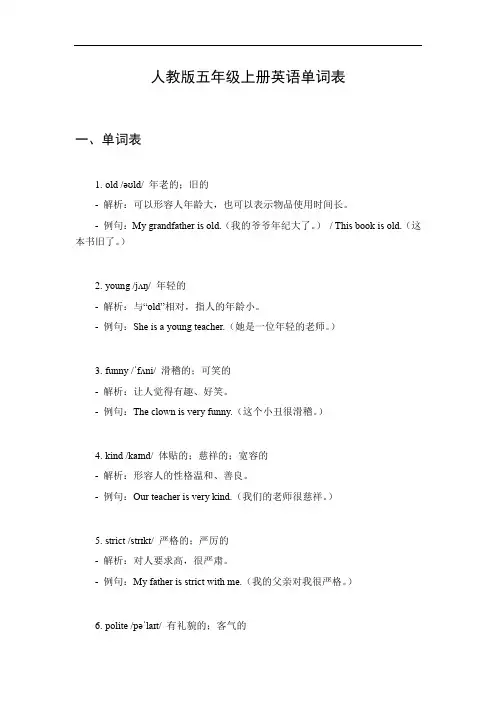
人教版五年级上册英语单词表一、单词表1.old /əʊld/ 年老的;旧的-解析:可以形容人年龄大,也可以表示物品使用时间长。
-例句:My grandfather is old.(我的爷爷年纪大了。
)/ This book is old.(这本书旧了。
)2.young /jʌŋ/ 年轻的-解析:与“old”相对,指人的年龄小。
-例句:She is a young teacher.(她是一位年轻的老师。
)3.funny /ˈfʌni/ 滑稽的;可笑的-解析:让人觉得有趣、好笑。
-例句:The clown is very funny.(这个小丑很滑稽。
)4.kind /kaɪnd/ 体贴的;慈祥的;宽容的-解析:形容人的性格温和、善良。
-例句:Our teacher is very kind.(我们的老师很慈祥。
)5.strict /strɪkt/ 严格的;严厉的-解析:对人要求高,很严肃。
-例句:My father is strict with me.(我的父亲对我很严格。
)6.polite /pəˈlaɪt/ 有礼貌的;客气的-解析:行为举止得体,尊重他人。
-例句:He is a polite boy.(他是一个有礼貌的男孩。
)7.hard-working /ˌhɑːd ˈwɜːkɪŋ/ 工作努力的;辛勤的-解析:形容人在工作或学习上很勤奋。
-例句:She is a hard-working student.(她是一个努力学习的学生。
)8.helpful /ˈhelpfl/ 有用的;愿意帮忙的-解析:能够给予帮助,发挥作用。
-例句:He is always helpful.(他总是很愿意帮忙。
)9.clever /ˈklevə(r)/ 聪明的;聪颖的-解析:头脑灵活,学习能力强。
-例句:The little girl is very clever.(这个小女孩很聪明。
)10.shy /ʃaɪ/ 羞怯的;腼腆的;怕生的-解析:在陌生人面前或特定场合容易感到紧张、不自在。
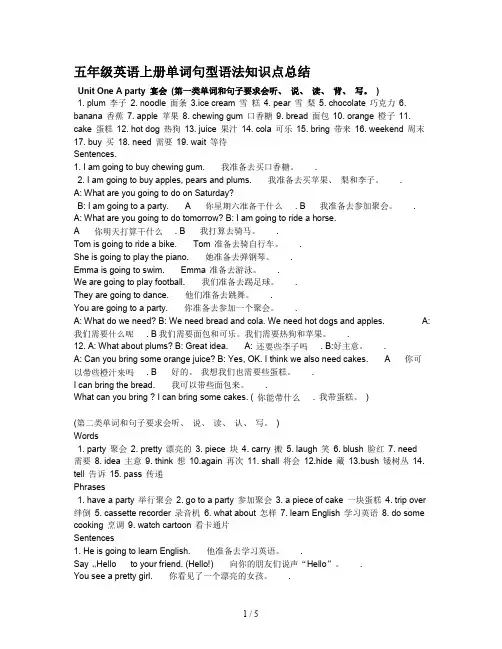
五年级英语上册单词句型语法知识点总结Unit One A party 宴会(第一类单词和句子要求会听、说、读、背、写。
)1. plum 李子2. noodle 面条3.ice cream 雪糕4. pear 雪梨5. chocolate 巧克力6. banana 香蕉7. apple 苹果8. chewing gum 口香糖9. bread 面包10. orange 橙子11. cake 蛋糕12. hot dog 热狗13. juice 果汁14. cola 可乐15. bring 带来16. weekend 周末17. buy 买18. need 需要19. wait 等待Sentences.1. I am going to buy chewing gum. 我准备去买口香糖。
.2. I am going to buy apples, pears and plums. 我准备去买苹果、梨和李子。
.A: What are you going to do on Saturday?B: I am going to a party. A . B我准备去参加聚会。
.A: What are you going to do tomorrow? B: I am going to ride a horse.A . B我打算去骑马。
.Tom is going to ride a bike. Tom 准备去骑自行车。
.She is going to play the piano. 她准备去弹钢琴。
.Emma is going to swim. Emma 准备去游泳。
.We are going to play football. 我们准备去踢足球。
.They are going to dance. 他们准备去跳舞。
.You are going to a party. 你准备去参加一个聚会。
.A: What do we need? B: We need bread and cola. We need hot dogs and apples.A: 我们需要 . B我们需要面包和可乐。
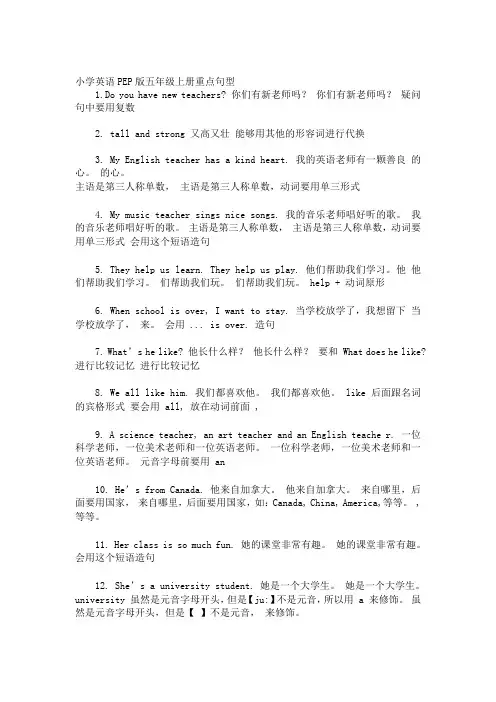
小学英语PEP版五年级上册重点句型1.Do you have new teachers? 你们有新老师吗?你们有新老师吗?疑问句中要用复数2. tall and strong 又高又壮能够用其他的形容词进行代换3. My English teacher has a kind heart. 我的英语老师有一颗善良的心。
的心。
主语是第三人称单数,主语是第三人称单数,动词要用单三形式4. My music teacher sings nice songs. 我的音乐老师唱好听的歌。
我的音乐老师唱好听的歌。
主语是第三人称单数,主语是第三人称单数,动词要用单三形式会用这个短语造句5. They help us learn. They help us play. 他们帮助我们学习。
他他们帮助我们学习。
们帮助我们玩。
们帮助我们玩。
help + 动词原形6. When school is over, I want to stay. 当学校放学了,我想留下当学校放学了,来。
会用 ... is over. 造句7. What’s he like? 他长什么样?他长什么样?要和 What does he like?进行比较记忆进行比较记忆8. We all like him. 我们都喜欢他。
我们都喜欢他。
like 后面跟名词的宾格形式要会用 all, 放在动词前面 ,9. A science teacher, an art teacher and an English teache r. 一位科学老师,一位美术老师和一位英语老师。
一位科学老师,一位美术老师和一位英语老师。
元音字母前要用 an10. He’s from Canada. 他来自加拿大。
他来自加拿大。
来自哪里,后面要用国家,来自哪里,后面要用国家,如:Canada, China, America,等等。
,等等。
11. Her class is so much fun. 她的课堂非常有趣。
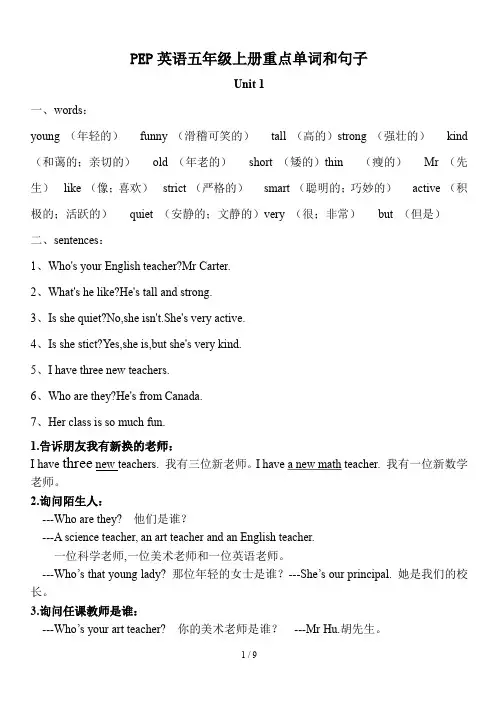
PEP英语五年级上册重点单词和句子Unit 1一、words:young (年轻的)funny (滑稽可笑的)tall (高的)strong (强壮的)kind (和蔼的;亲切的)old (年老的)short (矮的)thin (瘦的)Mr (先生)like (像;喜欢)strict (严格的)smart (聪明的;巧妙的)active (积极的;活跃的)quiet (安静的;文静的)very (很;非常)but (但是)二、sentences:1、Who's your English teacher?Mr Carter.2、What's he like?He's tall and strong.3、Is she quiet?No,she isn't.She's very active.4、Is she stict?Yes,she is,but she's very kind.5、I have three new teachers.6、Who are they?He's from Canada.7、Her class is so much fun.1.告诉朋友我有新换的老师:I have three new teachers. 我有三位新老师。
I have a new math teacher. 我有一位新数学老师。
2.询问陌生人:---Who are they? 他们是谁?---A science teacher, an art teacher and an English teacher.一位科学老师,一位美术老师和一位英语老师。
---Who’s that young lady? 那位年轻的女士是谁?---She’s our principal. 她是我们的校长。
3.询问任课教师是谁:---Who’s your art teacher? 你的美术老师是谁?---Mr Hu.胡先生。
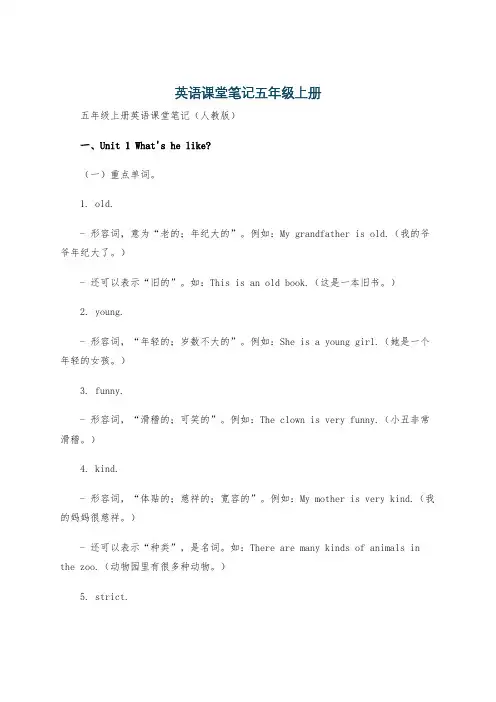
英语课堂笔记五年级上册五年级上册英语课堂笔记(人教版)一、Unit 1 What's he like?(一)重点单词。
1. old.- 形容词,意为“老的;年纪大的”。
例如:My grandfather is old.(我的爷爷年纪大了。
)- 还可以表示“旧的”。
如:This is an old book.(这是一本旧书。
)2. young.- 形容词,“年轻的;岁数不大的”。
例如:She is a young girl.(她是一个年轻的女孩。
)3. funny.- 形容词,“滑稽的;可笑的”。
例如:The clown is very funny.(小丑非常滑稽。
)4. kind.- 形容词,“体贴的;慈祥的;宽容的”。
例如:My mother is very kind.(我的妈妈很慈祥。
)- 还可以表示“种类”,是名词。
如:There are many kinds of animals in the zoo.(动物园里有很多种动物。
)5. strict.- 形容词,“要求严格的;严厉的”。
例如:Our teacher is strict.(我们的老师很严格。
)(二)重点句型。
1. - What's he like?(他是什么样的人?)- He is old and kind.(他年纪大而且很慈祥。
)- 这个句型用来询问某人的外貌特征或者性格特点。
2. - Is she strict?(她严格吗?)- Yes, she is. / No, she isn't.(是的,她严格。
/ 不,她不严格。
)- 这是一般疑问句及其回答,用来询问某人是否具有某种性格特点或者外貌特征。
二、Unit 2 My week。
(一)重点单词。
1. Monday.- 名词,“星期一”。
注意首字母大写。
例如:We have English on Monday.(我们星期一有英语课。
)2. Tuesday.- 名词,“星期二”。
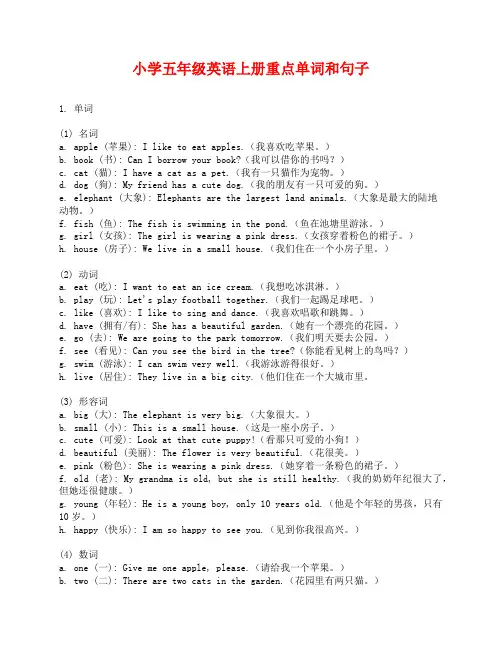
小学五年级英语上册重点单词和句子1. 单词(1) 名词a. apple (苹果): I like to eat apples.(我喜欢吃苹果。
)b. book (书): Can I borrow your book?(我可以借你的书吗?)c. cat (猫): I have a cat as a pet.(我有一只猫作为宠物。
)d. dog (狗): My friend has a cute dog.(我的朋友有一只可爱的狗。
)e. elephant (大象): Elephants are the largest land animals.(大象是最大的陆地动物。
)f. fish (鱼): The fish is swimming in the pond.(鱼在池塘里游泳。
)g. girl (女孩): The girl is wearing a pink dress.(女孩穿着粉色的裙子。
)h. house (房子): We live in a small house.(我们住在一个小房子里。
)(2) 动词a. eat (吃): I want to eat an ice cream.(我想吃冰淇淋。
)b. play (玩): Let's play football together.(我们一起踢足球吧。
)c. like (喜欢): I like to sing and dance.(我喜欢唱歌和跳舞。
)d. have (拥有/有): She has a beautiful garden.(她有一个漂亮的花园。
)e. go (去): We are going to the park tomorrow.(我们明天要去公园。
)f. see (看见): Can you see the bird in the tree?(你能看见树上的鸟吗?)g. swim (游泳): I can swim very well.(我游泳游得很好。
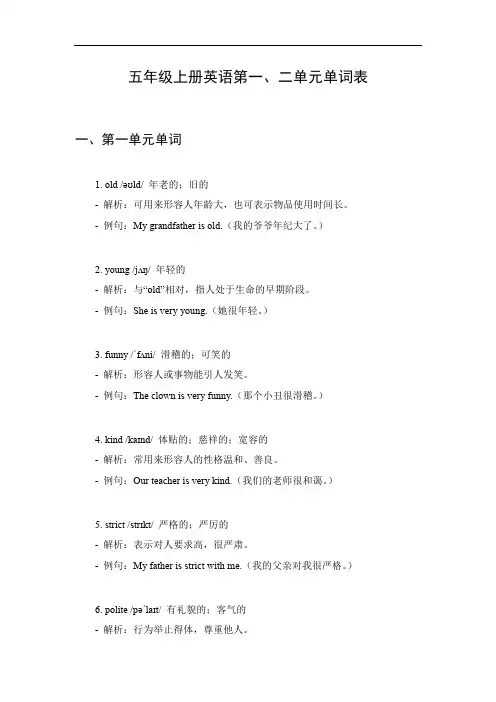
五年级上册英语第一、二单元单词表一、第一单元单词1. old /əʊld/ 年老的;旧的-解析:可用来形容人年龄大,也可表示物品使用时间长。
-例句:My grandfather is old.(我的爷爷年纪大了。
)2. young /jʌŋ/ 年轻的-解析:与“old”相对,指人处于生命的早期阶段。
-例句:She is very young.(她很年轻。
)3. funny /ˈfʌni/ 滑稽的;可笑的-解析:形容人或事物能引人发笑。
-例句:The clown is very funny.(那个小丑很滑稽。
)4. kind /kaɪnd/ 体贴的;慈祥的;宽容的-解析:常用来形容人的性格温和、善良。
-例句:Our teacher is very kind.(我们的老师很和蔼。
)5. strict /strɪkt/ 严格的;严厉的-解析:表示对人要求高,很严肃。
-例句:My father is strict with me.(我的父亲对我很严格。
)6. polite /pəˈlaɪt/ 有礼貌的;客气的-解析:行为举止得体,尊重他人。
-例句:He is a polite boy.(他是一个有礼貌的男孩。
)7. hard-working /ˌhɑːd ˈwɜːkɪŋ/ 工作努力的;辛勤的-解析:强调在工作或学习上付出很多努力。
-例句:She is a hard-working student.(她是一个勤奋的学生。
)8. helpful /ˈhelpfl/ 有用的;愿意帮忙的-解析:能够给予帮助,很热心。
-例句:He is always helpful.(他总是很热心帮忙。
)9. clever /ˈklevə(r)/ 聪明的;聪颖的-解析:头脑灵活,学习能力强。
-例句:The little girl is very clever.(这个小女孩很聪明。
)10. shy /ʃaɪ/ 羞怯的;腼腆的;怕生的-解析:在陌生人面前或特定场合容易紧张、不自在。
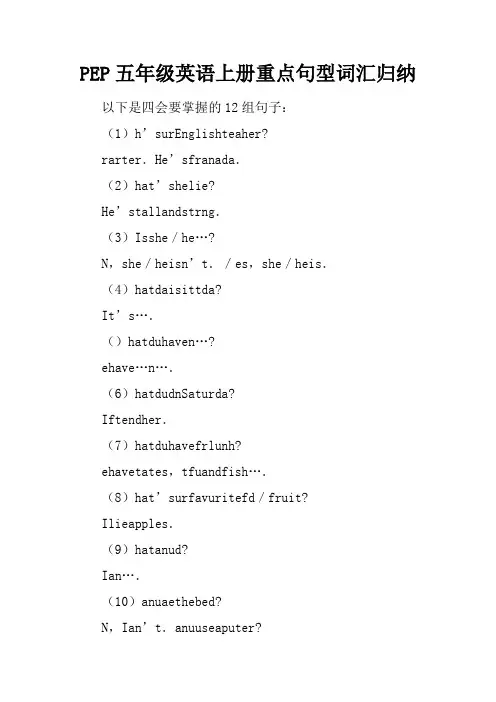
PEP五年级英语上册重点句型词汇归纳以下是四会要掌握的12组句子:(1)h’surEnglishteaher?rarter.He’sfranada.(2)hat’shelie?He’stallandstrng.(3)Isshe/he…?N,she/heisn’t./es,she/heis.(4)hatdaisittda?It’s….()hatduhaven…?ehave…n….(6)hatdudnSaturda?Iftendher.(7)hatduhavefrlunh?ehavetates,tfuandfish….(8)hat’surfavuritefd/fruit?Ilieapples.(9)hatanud?Ian….(10)anuaethebed?N,Ian’t.anuuseaputer?es,Ian.(11)Isthereariverinthepar?N,thereisn’t./es,thereis.(12)Aretherean…in…?N,therearen’t./es,thereare.以下是四会要掌握的9组单句:(1)She/He’sverfunn.(2)Butshe/heis….(3)hatabutu?(4)I…,t.()Theareseet.(6)Idn’tliegrapes.(7)Therearet…,a…anda…in….(8)Thereisa…,a…anda…in….(9)Thelseisn/near/under…Unit1ung(年轻的)funn(滑稽可笑的)tall(高的)strng(强壮的)ind(和蔼的、亲切的)ld(年老的)shrt(矮的)thin(瘦的)r(先生)lie(像、喜欢)strit(严格的)sart(聪明的、巧妙的)ative(积极的、活跃的)quiet(安静的、文静的)ver(很、非常)but(但是)Unit2nda(星期一)Tuesda(星期二)ednesda(星期三)Thursda (星期四)Frida(星期五)Saturda(星期六)Sunda(星期天)da(天)have(有、吃)n(在…时候)dher(做作业)athTV(看电视)readbs (读书)Unit3eggplant(茄子)fish(鱼)greenbeans(青豆)tfu (豆腐)ptat(土豆)tat(西红柿)fr(为)lunh(中餐)e(我们)tast(好吃的)seet(甜的)sur(酸的)fresh(新鲜的)salt(咸的)favurite(最喜欢的)theare(他们是)fruit(水果)grape(葡萄)Unit4theeals(烧饭)atertheflers(浇花)seeptheflr(扫地)leanthebedr(打扫卧室)aethebed(铺床)setthetable(摆饭桌)ashthelthes(洗衣服)dthedishes(洗碗碟)useaputer(使用计算机) Uniturtain(窗帘)trashbin(垃圾箱)lset(壁橱)irrr(镜子)endtable(床头柜)bedr(卧室)ithen(厨房)bathr(卫生间)livingr(客厅)in(在…里面)n(在…上面)under(在…下面)near(在旁边)behind(在…后边)lthes(衣服)Unit6river(河流)fler(花)grass(草)lae(湖泊)frest(森林)path(路)par(公园)piture(照片)huse(房子)bridge(桥)tree(树)rad(公路)building(建筑物)lean(干净的)。
人教版PEP英语五年级上册第一单元单词及重点句型需要掌握的单词:old 老的;年纪大了young 年轻的;岁数不大的funny 滑稽的;可笑的kind 体贴的;慈祥的;宽容的strict 要求严格的;严厉的polite 有礼貌的;客气的hard-working 工作努力的;辛劳的helpful 有用的;愿意帮忙的clever 聪明的;聪颖的shy 羞怯的;腼腆的;怕生的know 知道;了解our 我们的Ms 女士will 将要sometimes 有时,间或robot 机器人him 他speak 会说;会讲(某种语言);用(某种语言)说话finish 完成;做好单元知识点一、核心词汇1.表示人体貌特征及性格特点的形容词: old老的;年纪大的young年轻的;岁数不大的funny 滑稽的;可笑的kind 体贴的;慈祥的;宽容的strict 要求严格的;严厉的polite有礼貌的;客气的hard-working 工作努力的;辛勤的helpful 有用的;愿意帮忙的clever 聪明的;聪颖的shy 羞怯的;腼腆的;怕生的2.短语: head teacher校长birthday party生日派对二、了解词汇1. 单词: know知道;了解our我们的Ms (用于女子的姓氏或姓名前,不指明婚否)女士will(谈及将来)将要sometimes 有时;间或robot机器人him(用作宾语或表语)他speak会说;会讲(某种语言);用(某种语言)说话finish 完成;做好2.短语: be strict with …对……要求严格be going to打算三、核心句型1. —Who’s your English teacher?谁是你们的英语老师?—Miss White.怀特老师。
解读:这是询问某个学科的老师是谁的句型及回答。
2. —What’s she like?她什么样?—She’s kind.她很和蔼。
五年级上册的重点单词和句型重点单词:Unit 1:Y oung年轻的;funny滑稽可笑的;tall高的;strong强壮的;kind 和蔼的,亲切的;old年老的;short矮的;thin 瘦的;who's=who is是谁;Mr 先生;what's=what is是什么;like像,喜欢;he's=he is 他是;strict严格的;smart 聪明的,巧妙的;active 积极的,活跃的;quiet安静的,文静的;she's=she is 她是;very很,非常;but 但是。
Unit 2: Monday星期一;Tuesday 星期二;Wednesday 星期三;Thursday 星期四;Friday星期五;Saturday星期六;Sunday星期日;day 天,日子;have 吃,喝,有;on在.....的时候;do homework 做作业;watch TV 看电视;read books读书;what about....怎么样;too 也,太。
Unit 3:eggplant茄子;fish 鱼;green beans青豆;tofu豆腐;potato 西红柿;tomato土豆;for为,给;lunch中餐,午饭;we 我们;tasty好吃的,可口的;sweet甜的;sour酸的;fresh新鲜的;salty 咸的;favourite 最喜爱的,特别喜爱的;they're=they are他/她/它们是;fruit水果;don't=do not 不;grape 葡萄。
Unit4:cook the meals做饭;water the flowers 浇花;sweep the floor 扫地;clean the bedroom 打扫卧室;make the bed 铺床;set the table 摆饭桌,摆餐具;wash the clothes洗衣服;do the dishes洗碗碟;can't=can not 不会;use a computer 使用计算机。
五年级上册第一单元单词一、old [əʊld] adj.(形容词)1. 年老的;年纪大的。
- 例如:My grandfather is very old.(我的祖父很老了。
)2. 旧的;破旧的。
- 例如:This is an old book.(这是一本旧书。
)二、young [jʌŋ] adj.(形容词)1. 年轻的;岁数不大的。
- 例如:She is a young girl.(她是一个年轻的女孩。
)2. 幼崽的;未成熟的。
- 例如:The young animals are very cute.(幼小动物很可爱。
)三、funny ['fʌni] adj.(形容词)1. 滑稽的;好笑的。
- 例如:The clown is very funny.(这个小丑非常滑稽。
)2. 奇怪的;难以解释的。
- 例如:There is a funny smell in the room.(房间里有一股奇怪的气味。
)四、kind [kaɪnd] adj.(形容词)n.(名词)1. 形容词用法。
- 体贴的;慈祥的;宽容的。
- 例如:My mother is very kind.(我的妈妈很慈祥。
)2. 名词用法。
- 种类。
- 例如:There are all kinds of books in the library.(图书馆里有各种各样的书。
)五、strict [strɪkt] adj.(形容词)1. 要求严格的;严厉的。
- 例如:Our teacher is very strict.(我们的老师非常严格。
)六、polite [pə'laɪt] adj.(形容词)1. 有礼貌的;客气的。
- 例如:He is a polite boy.(他是一个有礼貌的男孩。
)七、hard - working [ˌhɑː d ˈwɜːkɪŋ] adj.(形容词)1. 工作努力的;辛勤的。
- 例如:My father is hard - working.(我的爸爸工作很努力。
五年级上册单词句子Unit 1 What's he like?一、单词。
1. old [əʊld] adj. 老的;年纪大的。
2. young [jʌŋ] adj. 年轻的;岁数不大的。
3. funny ['fʌni] adj. 滑稽的;可笑的。
4. kind [kaɪnd] adj. 体贴的;慈祥的;宽容的。
5. strict [strɪkt] adj. 要求严格的;严厉的。
6. polite [pə'laɪt] adj. 有礼貌的;客气的。
7. hard - working [ˌhɑː d ˈwɜːkɪŋ] adj. 工作努力的;辛勤的。
8. helpful ['helpfl] adj. 有用的;愿意帮忙的。
9. clever ['klevə(r)] adj. 聪明的;聪颖的。
10. shy [ʃaɪ] adj. 羞怯的;腼腆的;怕生的。
二、句子。
1. - What's he like? [wɒts hiː laɪk] 他什么样?- He's polite. [hiːz pəˈlaɪt] 他很有礼貌。
2. - Is she strict? [ɪz ʃiː strɪkt] 她严厉吗?- Yes, she is. [jes ʃiːɪz] 是的,她是。
3. - Do you know Mr Young? [duː juː nəʊˈmɪstə(r) jʌŋ] 你认识杨先生吗?- Yes. He's our music teacher. [jes. hiːz ˈaʊə(r) ˈmjuːzɪk ˈti ːtʃə(r)] 是的。
他是我们的音乐老师。
Unit 2 My week.一、单词。
1. Monday ['mʌndeɪ] n. 星期一。
2. Tuesday ['tjuːzdeɪ] n. 星期二。
3. Wednesday ['wenzdeɪ] n. 星期三。
1-6单元重点单词和句型Who’s your Chinese teacher? Mr Xiao.What’s he like? He’s tall and thin. He’s very strict, but he’s very funny.Is he tall? Yes, he is. Is he strong? No, he isn’t.Who’s your English teacher? Miss Li.What’s she like? She’s short and thin. She’s young. She’s kind.Is she thin? Yes, she is. Is she strong? No, she isn’t.话题作文:用几句话介绍你最喜爱的老师。
(长得怎样?高还是矮?强壮还是瘦弱?年轻还是年老?性格特征等等)___________________________________________________________________ ___________________________________________________________________ ___________________________________________________________________ ___________________________________________________________________What day is it today? It’s Monday.What do you have on Mondays? We have Chinese, English, Math and Music. What do you do on Saturdays? I do my homework.What about you? I do my homework, too.话题作文:My day of the week,介绍一个星期每天上的科目或活动等情况。
___________________________________________________________________ ___________________________________________________________________What do you have for lunch on Mondays? We have tomatoes, tofu and fish. What’s your favourite food? Fish.What’s your favourite fruit? I like apples. They’re sweet.I like fruit. But I don’t like grapes. They’re sour.话题作文:My day, 写出星期几,这天你上什么课,一日三餐吃什么,进行什么样的活动。
___________________________________________________________________ ___________________________________________________________________ ___________________________________________________________________What can you do? I can sweep the floor.Can you make the bed? No, I can’t.Can you use a computer? Yes, I can.话题作文:介绍你自己会做的和不会做的一些家务。
___________________________________________________________________ ___________________________________________________________________ ___________________________________________________________________ ___________________________________________________________________What’s your room like?There is a closet, a shelf, a desk and a bed.What’s in your flat?There are two bedrooms, a kitchen, a bathroom and a living room.Where is the closet?The closet is near the table.Where is the trash bin?The trash bin is behind the door.Many clothes are in the closet.话题作文:介绍你的房间。
___________________________________________________________________ ___________________________________________________________________ ___________________________________________________________________Is there a forest in the park? Yes, there is.Is there a river? No, there isn’t.Are there any pandas in the mountain? No, there aren’t.Are there any fish in the rivers? Yes, there are.话题作文:描写你喜欢的公园。
___________________________________________________________________专题练习:一、阅读短文。
判断下列句子是否正确,正确的打“√”,错误的打“×”。
Hello! I am John. I am in Grade Five. I have a new neighbour. She is a doctor. She is Miss Wang. She is an university student. She is 22. She is tall and strong. She is strict, but active. She likes singing. I like her very much.( )1. John is a student.( )2.Miss Wang is a science teacher.( )3.Mrs Wang is my new neighbour.( )4.Miss Wang is thin and tall.( )5.Miss Wang like sports.二、阅读短文。
判断下列句子是否正确,正确的打“√”,错误的打“×”。
My name is Anna. I am a student. I’m twelve. I’m from England. I have a new math teacher. He’s very young. He’s kind and nice. He likes sports. He’s strict, but funny. We all like him.( )1.Anna is an American girl.( )2.Anna is a teacher.( )3.Her math teacher is kind and nice.( )4.Her math teacher likes to stay at home.( )5.Anna does n’t like her math teacher.三、阅读短文。
判断下列句子是否正确,正确的打“√”,错误的打“×”。
Hello, my name is Tim. I like Chinese. Mrs. Wang is our Chinese teacher. She’s strict, but she’s very funny. We all like her. I often read Chinese books on Sunday morning, then I go shopping. In the afternoon, I play football with my classmates. Sometimes, I go swimming. In the evening, I do my homework and watch TV. I am very happy on Sunday. I love Sunday. What about you?( )1.Mrs. Wang is strict, but funny math teacher.( )2.Tim often had Chinese class on Saturday.( )3.Tim plays basketball on Sunday afternoon.( )4.Tim watches TV on Sunday evening.( )5.Tim likes Sunday very much.It is seven o’clock in the morning. I get up and make the bed. I go to school at eight o’clock. It’s Monday. We have English, math, Chinese and art in the morning. In the afternoon, we have P.E. class. I like playing football. I often do homework in the evening.( )1.I go to school at 7:30.( )2.Today is Tuesday.( )3.We have four classes in the morning.( )4.We have P.E. in the afternoon.( )5.I don’t do homework in the evening.五、阅读短文。